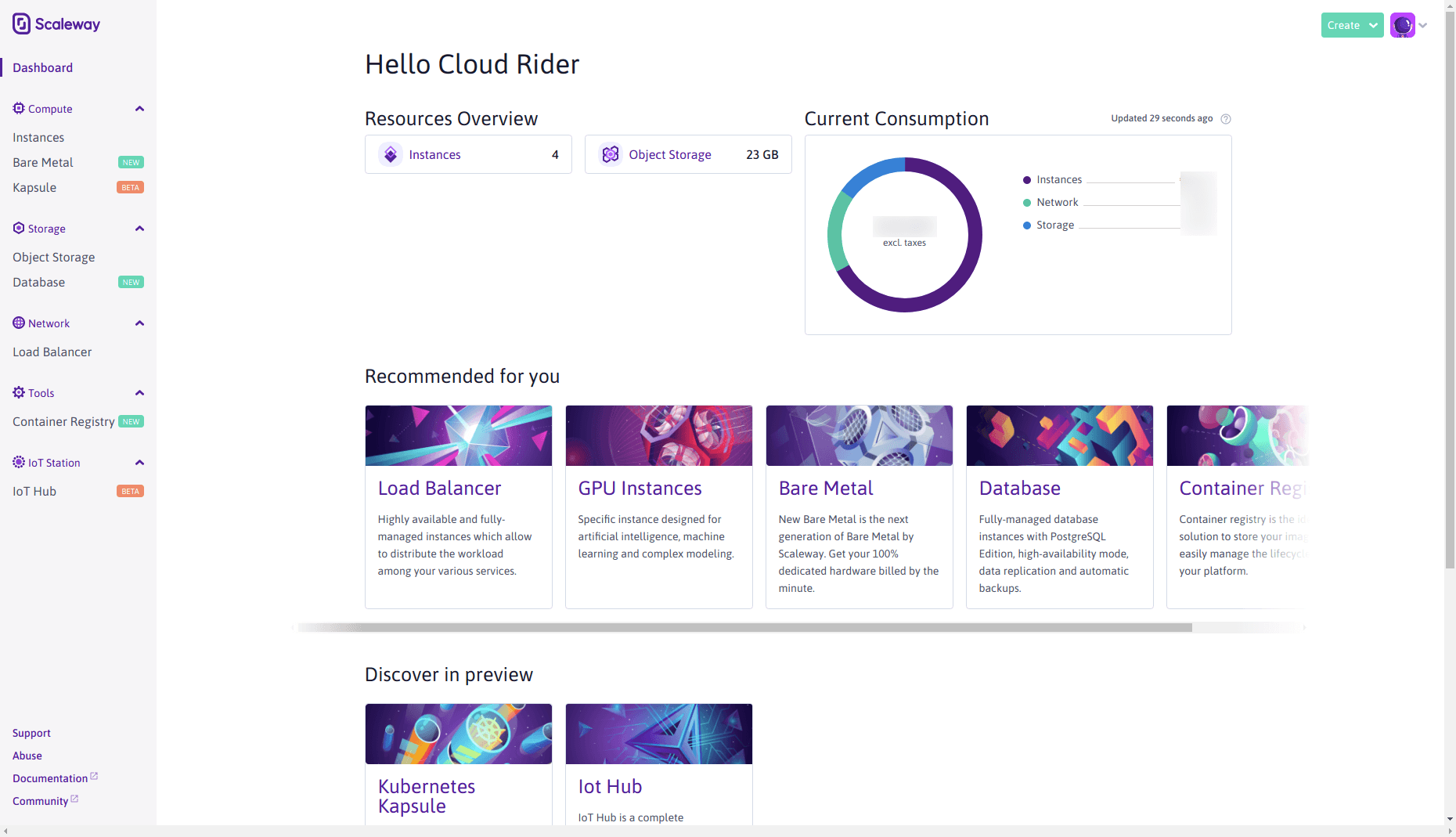Scaleway is an infrastructure provider that was established a few years ago offering equipment based on the ARM platform. As one of the first in the world they offered their clients virtual and dedicated machines based on ARM architecture, since then a lot has changed.
Short story
2015
Online introduces Scaleway, the world's first Cloud Computing IaaS (Infrastructure as a Service) platform supported by ARM BareMetal SSD servers, for 2 eurocents per hour.2016
Very quickly Scaleway is successful and becomes the first supplier offering the full version of BareMetal. In parallel, a new data center is being built in Amsterdam.2017
Scaleway begins the year with strong growth and is gaining the recognition of a new generation of programmers. In parallel, the company takes the opportunity to expand its product range.2018
Launch of an extensive transformation and research and development plan: next generation data centers, mass recruitment, unique living spaces (Les Maisons) ... Scaleway is gradually becoming the main online brand.2019
Scaleway obtains HDS certification that enables hosting of health data. The company also organized the first edition of ScaleDay'n Night, IT events with nearly 1,200 participants (customers, suppliers, outsourcing managers, press, etc.).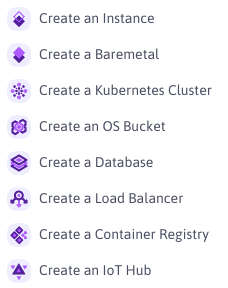
To date, the range of Scaleway products includes:
- - Compute - VPS (x86 and ARM), GPU, Bare metal (dedicated servers), Operation of Kubernetes-based services and Serverlss services
- - Storage - Managed databases (Psql), Object Storage (compatible with S3 protocol), Block and Cold Storage
- - Network - Load Balancer, DOmeny, VPC and Multicloud Load Balancer services
- - IoT - IoT Hub - MQTT based message queue
- - AI - Instances of GPU needed to train models
As you can see from the above, Scaleway is slowly becoming a full-fledged provider of cloud-based solutions. Following the development of the platform over the last few years, I am surprised how dynamically they are developing, especially when it comes to last year. Of course, they are still far from Amazon or Google in terms of services offered, but remember that this is a platform not managed by a global giant and does not have infinite resources. From my perspective, it is important that they develop steadily and add new products to their services. At the moment, they are certainly not a threat to these two, but they are certainly an alternative worth considering when looking for a new provider.
Available equipment
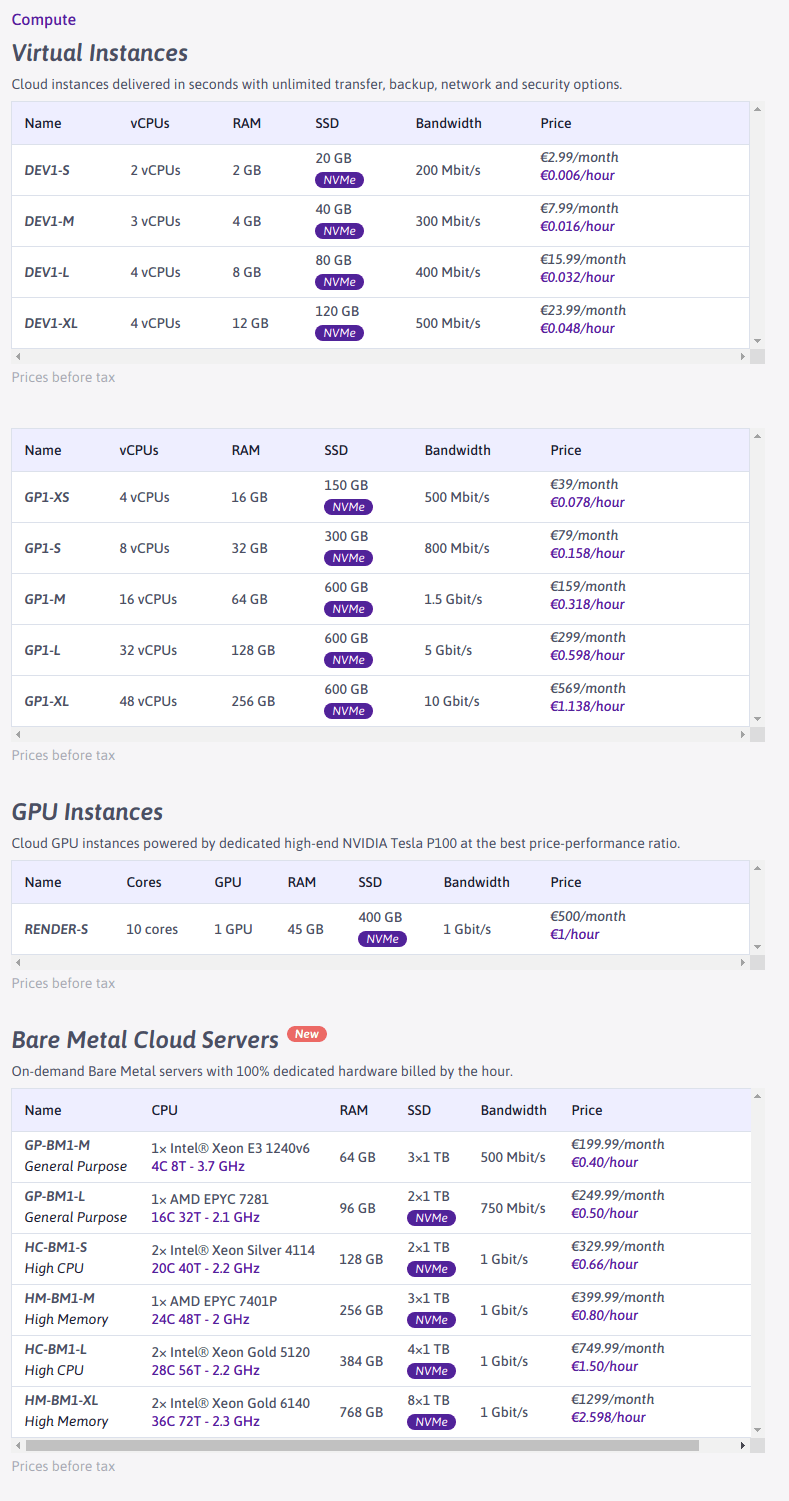
As of today, the price list of available machines at Scaleway looks very interesting and encouraging. Especially if we consider the costs in terms of the whole month. Scaleway allows us to start many cheap servers, each of which can perform a separate function. At Code Fibers, we practice such solutions. Thanks to ready-made application images available in Scaleway, we were able to launch many applications with just a few clicks. For example: we use GIT to store the code, and the number of our projects is constantly growing, which is why the demand for new repositories is also growing. We decided to host our code on our own. Open Source projects such as Gitlab or Gogs come to the rescue and we have used the latter using the ready image of the application in Scaleway. After selecting the image and the machine we had a working code repository in just 10 minutes without any additional installations. The entire cost of this project is about 4 euros a month, and thanks to it we gain the opportunity to share our code with many users without incurring additional costs. In the future, we plan to launch a separate instance supporting Continous Integration & Delivery also using cheap instances in Scaleway.
The only thing that has happened to us so far and which we have not been able to jump over is the possibility of connecting multiple IP addresses to one Compute instance. Unfortunately, Scaleway does not allow this operation and limits the number of IPs assigned to the machine to one. Unfortunately, it is not visible that they have plans to change this state of affairs. This makes it difficult to use Scaleway as a provider in projects that make extensive use of proxies or have a need to rotate IP addresses. On the other hand, the low price of the instance and hourly billing opens up the possibility for us to build architectures based on the existence of the instance only for a limited time. It is possible to automate such a solution because Scaleway provides an API.
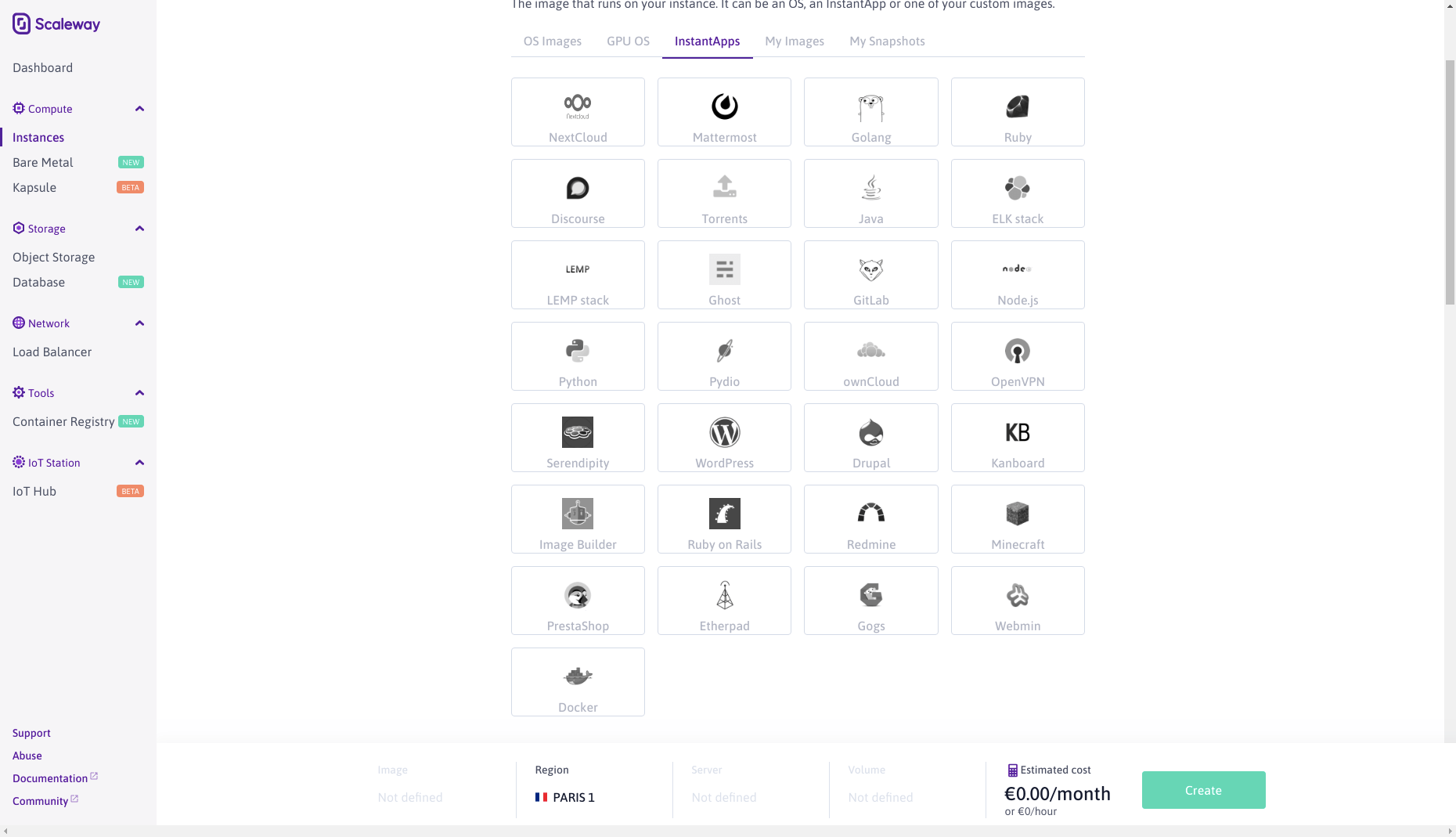
Scaleway Object Storage - compatible with S3
The last new feature in Scaleway is Object Storage compatible with the S3 AWS protocol. In short - this service allows you to send any file of theoretically any size which will then be available at a specific URL. The fee is for the amount of space used and for data transfer between the data center and the external network. The price list for the service is competitive, but the service is still too young to pass more sentences. We at Code Fibers use this service as an external medium for our cloud based on the Nextcloud (open source) project, which we also de facto host at Scaleway on an instance that was created using the application image. Thanks to this, we have our own cloud storage for files that we use in projects without the need for Dropbox or Google Drive solutions.
Data center, Web UI, Rest API
At the moment, Scaleway has 5 datacenters, one located in the Netherlands and 4 located in France. Despite the considerable distance, for example from Warsaw, the increased access time is not noticeable and connections take place without any problems. Having services purchased at OVH and machines located even in DC in Warsaw, we sometimes see longer access times to Warsaw than to the Netherlands or France. Here, Scaleway gains a big plus for really good quality of delivered machines.
Another thing to manage the entire infrastructure. Scaleway offers a minimalistic web interface and REST API. Why minimalistic? Because, unlike AWS, GCP or OVH, you can feel the breath of minimalism in Scaleway. It does not affect the functionality of the panel in any way, and the speed of its operation gives the experience of a really refined product.
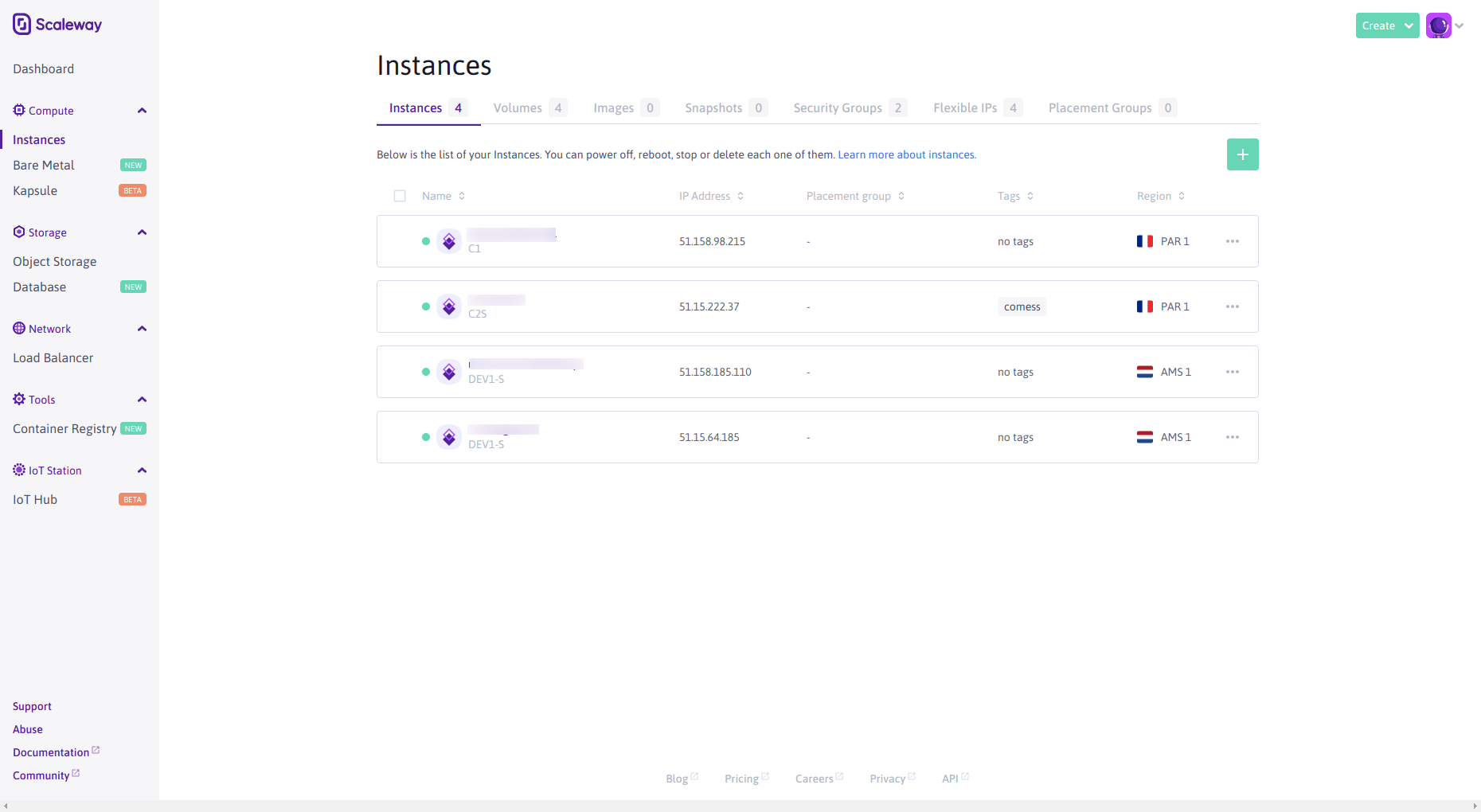
Reliability
Price vs. quality - Scaleway, AWS or GCP?
In terms of price, Scaleway is surprising. The cheapest instances start from just under 3 euros per month (hourly billing) and we will find a full offer of VPS and dedicated machines, also based on ARM architecture. What's more, the quality of the infrastructure delivered significantly wins with the AWS / GCP competition, the machines delivered are more performative and responsive.
I recommend reading the benchmarks that more accurately present the comparison between individual suppliers.
Scaleway vs GCP Compute Engine: https://www.vpsbenchmarks.com/compare/gce_vs_scaleway
Scaleway vs AWS EC2: https://www.vpsbenchmarks.com/compare/ec2_vs_scaleway
Scaleway vs OVH: https://www.vpsbenchmarks.com/compare/ovhcloud_vs_scaleway
Summary
I am very happy with Scaleway services and keep my fingers crossed for their development. Scaleway allows you to cheaply host projects with quick access from EU countries, and their continuous development places them in a pursuit group of current leaders who must work hard to maintain their position. If Scaleway maintains such a level of dynamic development, I believe that in the future they have a chance to become a global player and gain a serious piece of the market in cloud services.
